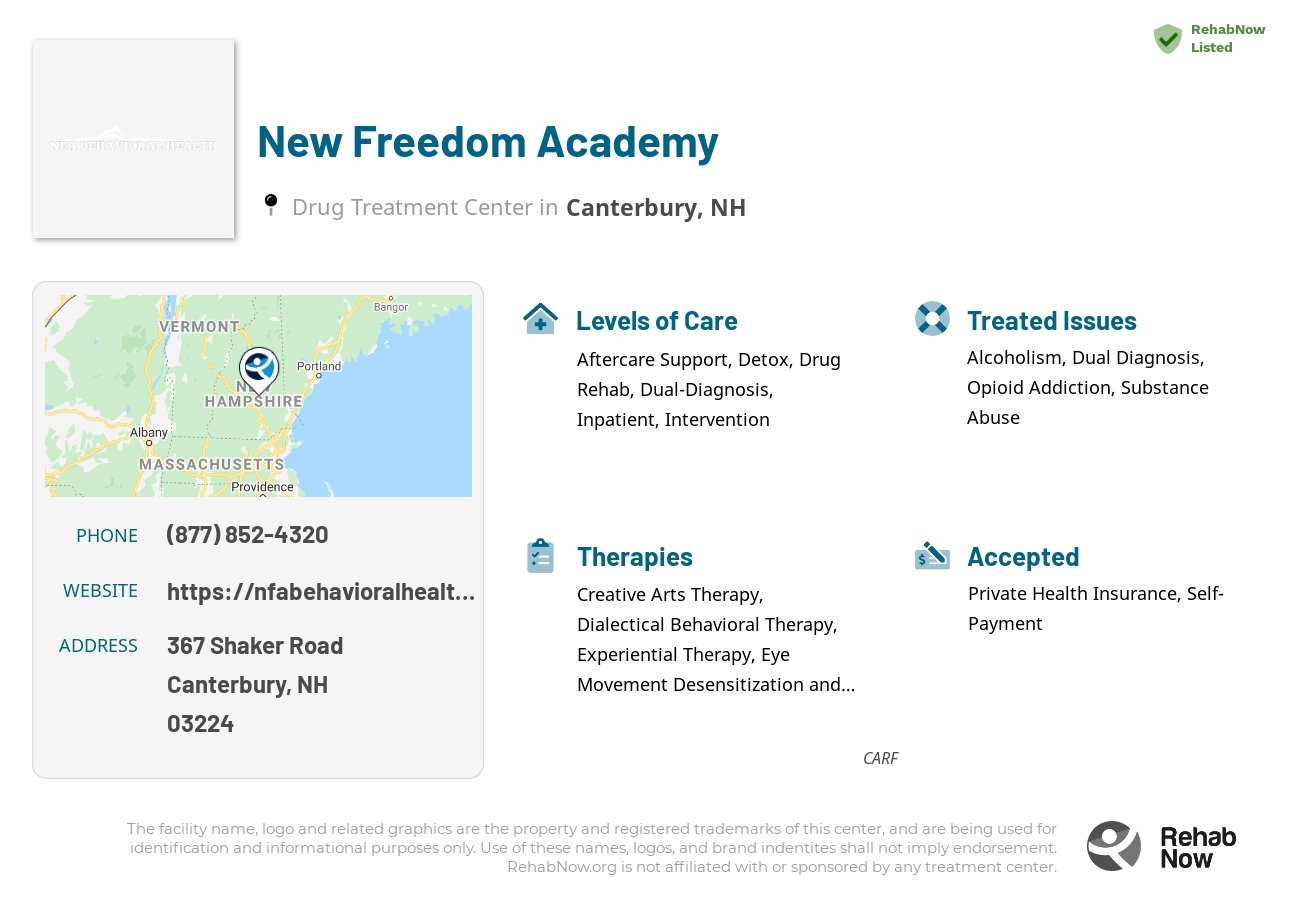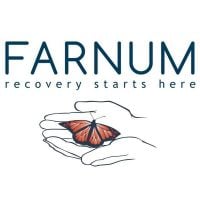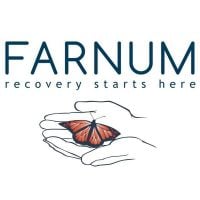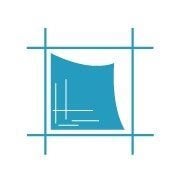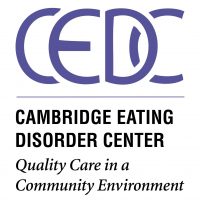New Freedom Academy
Drug Rehab Center in Canterbury, New Hampshire
New Freedom Academy in Canterbury, New Hampshire is a premier addiction treatment facility offering a range of services and levels of care to individuals suffering from addiction and substance abuse, including unique treatment options such as inpatient care, detox, drug rehab, and intervention, all in a safe and secure environment.
About New Freedom Academy in New Hampshire
New Freedom Academy (NFA) Behavioral Health is a trusted drug and alcohol rehab center located in the secluded environment of Canterbury, New Hampshire. As part of the Granite Recovery Centers, NFA offers a rejuvenating recovery experience focused on total health and wellness. This 20-bed inpatient facility provides a caring and inviting atmosphere for individuals seeking sobriety.
NFA boasts a stellar reputation and is committed to providing accessible addiction and mental health treatment to adults. Their comprehensive dual diagnosis substance use disorder rehab features a full continuum of care rooted in 12 Step philosophies and evidence-based therapies.
NFA is an accredited facility, certified by CARF, LegitScript, and NAATP, ensuring quality care and the latest treatment methods. Their services include medical detox, residential treatment, intensive outpatient program (IOP), outpatient services, and partial hospitalization program (PHP). These programs offer a range of therapies, such as individual and group counseling, holistic therapies, and Big Book workshops, tailored to address behavioral health challenges and promote personal growth.
- Safe and supervised medical detox services
- Residential treatment with round-the-clock care
- Structured IOP for maintaining daily commitments
NFA Behavioral Health specializes in treating various addictions, including alcohol, opioids, and other substance use disorders, as well as co-occurring mental health conditions.
Genders
Ages
Modality
Additional
Accreditations
NAATP

LegitScript

CARF
The Commission on Accreditation of Rehabilitation Facilities (CARF) is a non-profit organization that specifically accredits rehab organizations. Founded in 1966, CARF's, mission is to help service providers like rehab facilities maintain high standards of care.
Conditions and Issues Treated
Some addicts can benefit from substance abuse treatment, which is designed to help them become and remain sober without the use of medications. These programs are typically used by those struggling with drugs like marijuana or hallucinogens. However, they might be beneficial for those with a co-occurring mental health disorder like schizophrenia, major depression or bipolar disorder.
During this type of treatment, the addict will meet with therapists and other professionals on a regular basis to learn coping skills and healthy ways to deal with their addiction and mental health disorder.
Treatment programs often combine medications with counseling, support groups and even medical services like those found in hospitals or doctor’s offices. There are also detoxification services that addicts can use to get sober and avoid severe withdrawal symptoms.
Opioids are a group of drugs that include substances such as heroin, morphine, and oxycodone. These drugs activate opioid receptors in the brain, which produce pleasurable feelings. Opioid addiction occurs when drugs are abused at increasing rates or increasing amounts because the body becomes tolerant of them.
Opioid addiction is typically diagnosed when drug abuse becomes a typical behavior that interferes with an individual’s ability to function daily. The use of the substance results in consequences like legal problems.
Treatment for opioid addiction varies depending on each individual’s needs. Some treatments focus on replacing opioids with other drugs that have similar effects of reducing withdrawal symptoms. Other treatments aim to reduce the risk of relapse by providing psychological support or using more natural methods.
A drug rehab center that uses Dual Diagnosis is more likely to be successful in rehabilitating a person. Dual diagnosis helps to identify and treat any co-occurring disorders. It is essential to screen for both addiction and any untreated mental health issues. A dual diagnosis gives rehab the means to treat addiction while restoring mental and emotional health.
About 70% of patients with drug addiction have at least one other psychiatric diagnosis. Fortunately, dual diagnosis treatment is a proven model that has been highly effective.
Levels of Care Offered
This center offers a variety of custom treatment tailored to individual recovery. Currently available are Aftercare Support, Detox, Drug Rehab, Dual-Diagnosis, Inpatient, Intervention, with additional therapies available as listed below.
Detox, or detoxification, is the method of weaning a person’s body from the toxic substance(s) they have abused. This is a slow process under medical supervision and one that should occur for almost all individuals. As detox can cause medical complications, it should always be performed by experienced medical professionals in a safe setting.
Inpatient rehab means you live there while your addiction or co-occurring disorder is treated. Prescribed medications are used along with counseling.
This type of rehabilitation provides a drug-free environment for people who struggle with chronic/long-term addiction (or their own home). Jobs or school can be put on hold until after the stay to focus solely on recovery.
Interventions help families and friends express their feelings, express their desire for change, and plan for action. Interventionists are trained professionals who help family members plan or lead interventions. Family members should help choose an experienced professional to guide their loved one through treatment. Across the country, intervention services are available.
Aftercare Support in drug rehab is crucial because it helps people stay sober after treatment. Aftercare Support in drug rehab is helpful because it provides the recovering person with a support group, including family members, friends, and other peers who are also in recovery.
The benefits of Aftercare Support are that it provides a pathway that will help people get sober for life. It supports healing at all levels, physical, mental, emotional, and spiritual. Another benefit of Aftercare Support is that participants learn to maintain their sobriety through holistic methods. They learn to modify behaviors individually to have peace of mind, have positive relationships with others, and find peace on the inside.
Therapies & Programs
During individual therapy at New Freedom Academy in , the person in recovery meets with a therapist one on one to go over their situation and learn from past mistakes. The counselor or therapist will use this time to address the causes of addiction, triggers, and any mental issue or dual diagnosis. They will also address aftercare plans, giving them the best chances of long-term sobriety.
This therapeutic process is very intense and challenging to go through. Some clients may find it easier to open up with someone apart from their family or loved ones who understand their struggles and experience with addiction.
Addicts in Canterbury, NH can find support in group therapy at New Freedom Academy by finding peers who understand their situation and being held accountable. They also learn to develop faith, understanding, and insight into their addiction through shared conversations.
Group Therapy is employed by drug treatment centers to provide the recovering addict with a platform to talk about their feelings and experiences. It also provides for an opportunity to learn from other addicts who have successfully overcome their addiction. It is recommended that all group members be recovering addicts for this type of therapy to work.
Trauma therapy allows people who struggled with a past trauma to face the situation and learn from it. Many people go through traumatic events at an early age that later leads them into addiction as adults. By addressing this issue during treatment at New Freedom Academy in [/type], you can move forward with your recovery process and take back control of your sober future, too!
Traumas are one of the most common causes of psychological disorders such as Addiction Disorder. It’s often found among those diagnosed with Addictive Disorders because traumatized individuals have strong emotions or thoughts related to their traumas, leading to addictive behaviors.
Dialectical behavior therapy (DBT) is a cognitive-behavioral therapy that focuses on eliminating specific negative thoughts, such as suicidal thoughts. These negative thoughts can potentially lead to an individual inflicting self-harm. It helps treat patients exhibiting uncontrollable emotions, intense mood swings, and borderline personality disorders.
The term “Dialectic” means the integration of opposites. In substance abuse, DBT refers to accepting the patient’s addiction and working to change their thoughts and behavior. It improves life skills such as controlling intense emotions without reacting impulsively, resolving interpersonal conflicts effectively, and promoting awareness about self and others.
Cognitive Behavioral Therapy (CBT) helps addicts comprehend the causes of their substance abuse and the consequences that follow. The treatment’s goal is to help addicts gain self-control and maintain abstinence from drugs and alcohol over the long term. Through CBT, clients learn to recognize and avoid high-risk situations and cope with challenging situations when they arise.
Eye movement desensitization and reprocessing, or EMDR, is another therapeutic technique typically used for addiction recovery. This type of therapy works by stimulating brain activity to help the addict process past emotions without relapsing on their drug of choice.
EMDR can be particularly effective for recovering addicts who have trouble recalling the events that lead up to their addiction. By helping the addict recall these memories under safe conditions, this therapy can help reduce their risk of relapse during difficult moments.
Many people who struggle with addiction in Canterbury, New Hampshire also have trouble managing their daily responsibilities after treatment. With this type of therapy, addicts are taught how to manage their time, attain specific goals, and take care of all facets of their lives without the influence of drugs or alcohol.
During these sessions, therapists will work with addicts to identify personal values and goals. They will then help addicts set goals for achieving those values and standards. In the process, therapists help addicts develop strategies for fulfilling their goals and successfully managing their responsibilities.
In many cases, this type of therapy is used in conjunction with other types of addiction treatment services to address specific issues that affect a recovering addict’s ability to stay sober.
Nutrition therapy has been used as a treatment modality for addiction recovery and in eating disorders for adults, adolescents, and children. Specific nutrients have been identified that influence neurotransmitters associated with reward pathways of the brain. Carbohydrate loading with complex carbohydrates to elevate serotonin levels was effective in treating bulimia nervosa. This approach prompted researchers to explore the use of this type of nutritional intervention in other disorders.
Nicotine replacement therapy is a popular method of treatment that helps individuals overcome their addiction to cigarettes by providing them with safer alternatives. Nicotine replacement options can include:
- Inhalers
- Gum
- Patches
These treatments are often used in combination with other therapies, such as cognitive behavioral therapy or motivational interviewing, to help individuals more easily transition into a smoking-free lifestyle.
Patient Experience
Creative Arts
Creative arts therapy, or expressive therapy, is beneficial to those battling addiction. It can include writing, music, drama, art, and other forms of self-expression. It improves the patient’s emotional state and allows them to focus on something other than addiction. It allows New Freedom Academy to examine how their feelings and emotions play out through the creative process in Canterbury, NH.
Recovery can be a difficult process, but it is possible to heal and move forward with the help of creative arts therapy. If you or a loved one is struggling with addiction in , , consider using creative arts therapy to help the recovery process.
Experiential Therapy at New Freedom Academy
Experiential therapy is a type of treatment involving immediate, intense experiences designed to manage addiction. Experiential therapy is beneficial for:
- People who are seeking to overcome an addiction but have difficulty focusing on treatment goals
- People with short attention spans due to high levels of stress or difficulty concentrating
- People who are afraid of engaging in treatment due to negative past experiences
Payment Options Accepted
For specific insurance or payment methods please contact us.
Is your insurance accepted?
Ask an expert, call (888) 674-0062
Additional Details
Specifics, location, and helpful extra information.
Canterbury, New Hampshire 3224 Phone Number(877) 852-4320 Meta DetailsUpdated April 15, 2024
Staff Verified
New Freedom Academy Patient Reviews
There are no reviews yet. Be the first one to write one.
Canterbury, New Hampshire Addiction Information
Opioids such as fentanyl, heroin, and prescription opioids form the largest drug threat in New Hampshire. More than 80% of all New Hampshire treatment centers admissions were related to one or more of these three drugs. Opioids such as fentanyl, heroin, and prescription opioids form the largest drug threat in New Hampshire. Since 2002, rates of alcohol dependency have also been among the highest in the country. In 2015, almost 15% of the residents were admitted to treatment centers for alcohol abuse.
Treatment in Nearby Cities
- Franklin, NH (9.8 mi.)
- Pike, NH (52.9 mi.)
- Swanzey, NH (52.1 mi.)
- Seabrook, NH (45.2 mi.)
- Dublin, NH (42.6 mi.)
Centers near New Freedom Academy
The facility name, logo and brand are the property and registered trademarks of New Freedom Academy, and are being used for identification and informational purposes only. Use of these names, logos and brands shall not imply endorsement. RehabNow.org is not affiliated with or sponsored by New Freedom Academy.




